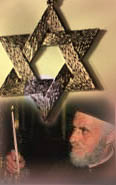What is Yom Kippur?

Jewish Day of Atonement considers spiritual well-being
 Related LinksYom Kippur Dates(beginning at sundown on the following dates)
|
Yom Kippur is one of the most serious Jewish holidays. Jews who do not regularly observe other holidays often make an exception for Yom Kippur, which occurs on the tenth day of the Hebrew month of Tishri. Yom Kippur observances can vary. Some non-Orthodox Jews might not follow the following outline exactly.
This is judgment day. Many Jews practice repentance, say prayers, and give charity to obtain God's forgiveness for any sins made in the past year. Yom Kippur is the culmination of a process that began a month earlier, during the Hebrew month of Elal. It follows Rosh Hashanah and the New Year's activities.
The Days of Awe, or Ten Days of Repentance, are the ten days between Rosh Hashanah and Yom Kippur. It offers a chance for spiritual renewal and repentance before Yom Kippur, which is to atone for sins between man and God. |
Days of Awe
After Rosh Hashanah and before Yom Kippur are ten days known as the Days of Awe, or Ten Days of Repentance. They offer a chance for spiritual renewal and repentance before Yom Kippur, which is to atone for sins between man and God.
Some Orthodox Jews hold a live fowl over their heads as atonement for sin. The fowl is killed and given to the poor. Instead of an actual bird, some Jews use a bag of money symbolizing the price of the bird. This is the ancient custom of kapparot, or atonements, and is practiced during the afternoon before Yom Kippur begins.
A confession, a special meal
During the afternoon prayers on the day before Yom Kippur, a viddui, or confessional, is said. It is repeated during Yom Kippur.
Yom Kippur requires a fast of about 25 hours. The final meal before is a somewhat festive occasion, including soup, chicken, and challah, traditional Jewish bread. Salty foods, which may make fasting more difficult, are generally avoided. Participants are advised to drink plenty of water and to brush their teeth before the fast begins. Those who usually drink a lot of caffeine are advised to start cutting down days before to avoid the headache associated with caffeine withdrawal.
Candles and a blessing
Two holiday candles are blessed and then lit. This signals the beginning of Yom Kippur. There is no more eating or drinking. Other prohibitions are: no bathing, no using creams and oils, no wearing of leather shoes, and no sexual relations. There are exceptions. Children who have not yet had their bar or bat-mitzvah, pregnant women, and people who are sick or infirm may eat or drink as needed. Some Reform Jews might not follow these prohibitions precisely.
A series of prayers is said during Yom Kippur. The Kol Nidrei is the first prayer, and should be recited before sunset. It is written in Aramaic, an ancient language. The Maariv is an evening service and includes the viddui.
During Yom Kippur, there is no eating or drinking. Other prohibitions are: no bathing, no using creams and oils, no wearing of leather shoes, and no sexual relations. |
Prayers for those who have died
In the morning, the Shaharit begins the day. It is similar to other morning services but includes additional poems, known as piyutim. Next is the Yizkor, a memorial prayer for those whose parents have died. Those with parents still living leave the main sanctuary while it is being said. The Musaf is the longest service of the year. It contains two parts: one which recounts the temple service, and the second describes the ten Jewish wise men tortured to death by the Romans.
Locking of the gates of heaven
Most synagogues take a break following the Musaf to allow worshippers to take a rest. In the afternoon, the Minhah, which includes the reading of the Book of Jonah, takes place. It is the briefest Yom Kippur service. It is followed by the Neilah, meaning "locked." It refers to the locking of the gates of heaven. The congregation stands during the Neilah. At the end of the afternoon service, the shofar, a ram's horn, is blown. Today various types of horns are used.
Families "break the fast," when they return home and eat a light meal often prepared in advance. This usually includes dairy products. Bagels and lox, noodle kugel, juice, and coffee are apt to be included.
- More from the Judaism Primer







